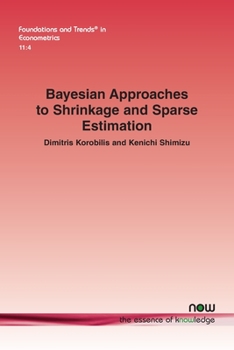Bayesian Approaches to Shrinkage and Sparse Estimation
Bayesian Approaches to Shrinkage and Sparse Estimation introduces the reader to the world of Bayesian model determination by surveying modern shrinkage and variable selection algorithms and methodologies. Bayesian inference is a natural probabilistic framework for quantifying uncertainty and learning about model parameters, and this feature is particularly important for inference in modern models of high dimensions and increased complexity. The authors begin with a linear regression setting in order to introduce various classes of priors that lead to shrinkage/sparse estimators of comparable value to popular penalized likelihood estimators (e.g. ridge, LASSO). They examine various methods of exact and approximate inference, and discuss their pros and cons. Finally, they explore how priors developed for the simple regression setting can be extended in a straightforward way to various classes of interesting econometric models. In particular, the following case-studies are considered that demonstrate application of Bayesian shrinkage and variable selection strategies to popular econometric contexts: i) vector autoregressive models; ii) factor models; iii) time-varying parameter regressions; iv) confounder selection in treatment effects models; and v) quantile regression models. A MATLAB package and an accompanying technical manual allows the reader to replicate many of the algorithms described in this review.
Format:Paperback
Language:English
ISBN:1638280347
ISBN13:9781638280347
Release Date:June 2022
Publisher:Now Publishers
Length:136 Pages
Weight:0.44 lbs.
Dimensions:0.3" x 6.1" x 9.2"
Customer Reviews
0 rating





